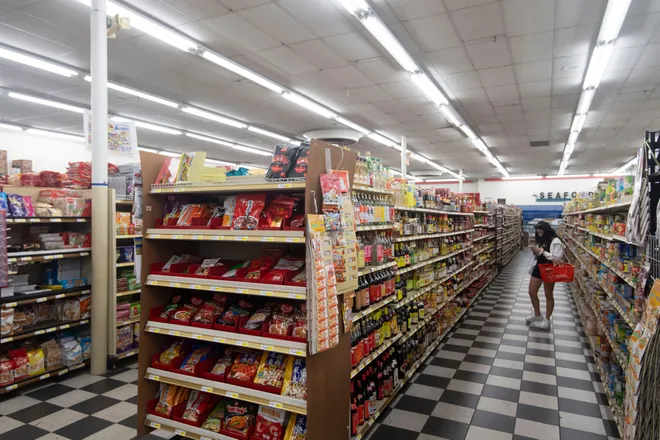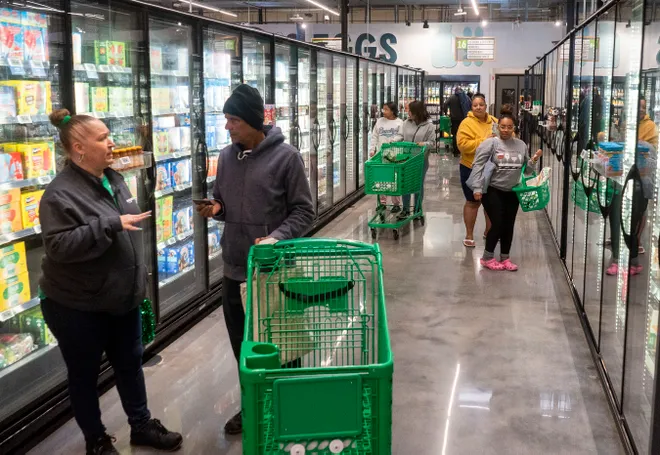The great supermarket souring: Why Americans are mad at grocery stores
American consumers may be souring on supermarkets.
In a recent Gallup poll, only 33% of Americans said they have a positive view of the grocery industry. That figure, published in September, is the lowest recorded in more than two decades of polling.
Analysts cite two big reasons for sinking public opinion of supermarkets: Rising prices and bad press.
Grocery prices are up by about 25% since before the pandemic. Food inflation has slowed, but surveys show consumers are still sensitive to rising prices.
Likely in response to public outcry over inflation, politicians have been assailing the grocery industry. Democratic presidential nominee Kamala Harris recently called out supermarkets for price-gouging. President Joe Biden chided the food industry for “shrinkflation” in his State of the Union address. The Federal Trade Commission accused grocery chains of exploiting product shortages to reap more profits. And even Cookie Monster weighed in on supermarket prices.
Capitalize on high interest rates: Best current CD rates
“You’ve had a ton of inflation, people are assessing blame, and you’ve had one of the major candidates encouraging that,” said Scott Mushkin, founder of R5 Capital, a market research firm.

Not long ago, Americans loved supermarkets
The erosion in public opinion of the grocery industry is all the more striking because, just a few years ago, Americans loved their supermarkets.
Gallup pollsters have been asking Americans for their views on the grocery industry since 2001. Public sentiment reached a peak in 2020, at the height of the pandemic, when 63% of consumers held positive views of the industry.
That was a time when much of the nation was avoiding restaurants, eating at home and relying more on supermarkets for sustenance.
“When people walked in a supermarket, they really felt that the supermarket was taking care of them, was going out of their way,” said Phil Lempert, a grocery industry analyst.
Grocery chains boldly experimented with pickup and delivery in the pandemic, analysts said. Supermarkets went out of their way to protect workers and customers, handing out masks, sanitizing grocery carts and spraying checkout conveyer belts.
Four years later, “the experience has deteriorated,” Mushkin said. “The stores have become cluttered.” Workers are no longer spraying conveyor belts. Lines seem longer.
“If you’re waiting in line, and you’re paying high prices, it’s hard to get a lot of goodwill,” Mushkin said.

Grocery prices rose by 12% in a single year
Inflation has eased from its 40-year high, reached in the summer of 2022. Between June 2021 and June 2022, grocery prices rose by 12.2%, a faster pace than the overall inflation rate.
But consumers still have inflation on their minds, especially at the supermarket.
The consumer confidence index declined sharply in September, slipping nearly seven points to 98.7. It was the largest drop in three years, fed by lingering inflation and fears about the labor market.
Two-thirds of Americans still consider inflation “a very serious problem,” placing it atop a list of national problems, according to a YouGov survey taken in August.
“Inflation fatigue has set in, I think,” said Sujeet Naik, a grocery analyst at Coresight Research. “At the aggregate level, the prices are still high compared to three or four years ago.”
The Biden administration and Harris have trained the public’s attention on price-gouging, blaming corporate greed for some of the inflation surge.
Biden has also taken issue with shrinkflation, or “downsizing,” a retail strategy of putting less of something in a container and selling it at the same price. Food companies have turned to downsizing as an alternative to raising prices.

'Shrinkflation': Consumers are taking note
Consumers are taking note. In a recent survey from the personal finance site Empower, 79% of consumers opined that “there are less chips/cereal/product in a bag than there used to be.”
“One of my main pet peeves with this is that now we have to buy two boxes of cereal to get the amount of food that we used to get in one box,” said Tracy Inge, 49, a supermarket shopper in Waterville, Maine, in an email interview with USA TODAY. “The boxes haven't shrunk, just the contents. We don't need more packaging to throw away in this country.”
Retail analysts say it’s not entirely fair to blame the supermarket industry for either price-gouging or shrinkflation. Profits are shrinking, and the industry is seeking ways to stay afloat.
Forecasters at Coresight Research expect grocery sales to grow by only 1.1% in 2024, down from 3.9% in 2023 and 9.1% in 2022.
Profit margins in the grocery industry dwindled to 1.6% in 2023, the lowest level since before the pandemic, according to industry journal Grocery Dive.
“The industry’s a little bit between a rock and a hard place,” Mushkin said.
Yet, when shoppers encounter high prices in the aisles, they often cast blame on the supermarket.
“It’s easy when you’re checking out, whether it’s in the store or online, to have a little sticker shock,” said David Bishop, a partner at the grocery-industry analyst Brick Meets Click.
Is that cereal box getting smaller?Welcome to the bewildering world of shrinkflation.
Supermarkets "need to instill confidence"
If supermarket chains want to regain lost luster with consumers, analysts said, they need to be more transparent with customers about why prices are rising.
“They need to instill confidence,” Lempert said. “And they instill confidence through education and disclosure.”
But the grocery industry has a long way to go, analysts say, before it will regain the goodwill of many wary shoppers.
“Until the election’s over, until prices stabilize,” Lempert said, “I think the next Gallup poll could be even worse.”
Disclaimer: The copyright of this article belongs to the original author. Reposting this article is solely for the purpose of information dissemination and does not constitute any investment advice. If there is any infringement, please contact us immediately. We will make corrections or deletions as necessary. Thank you.







